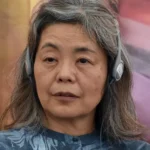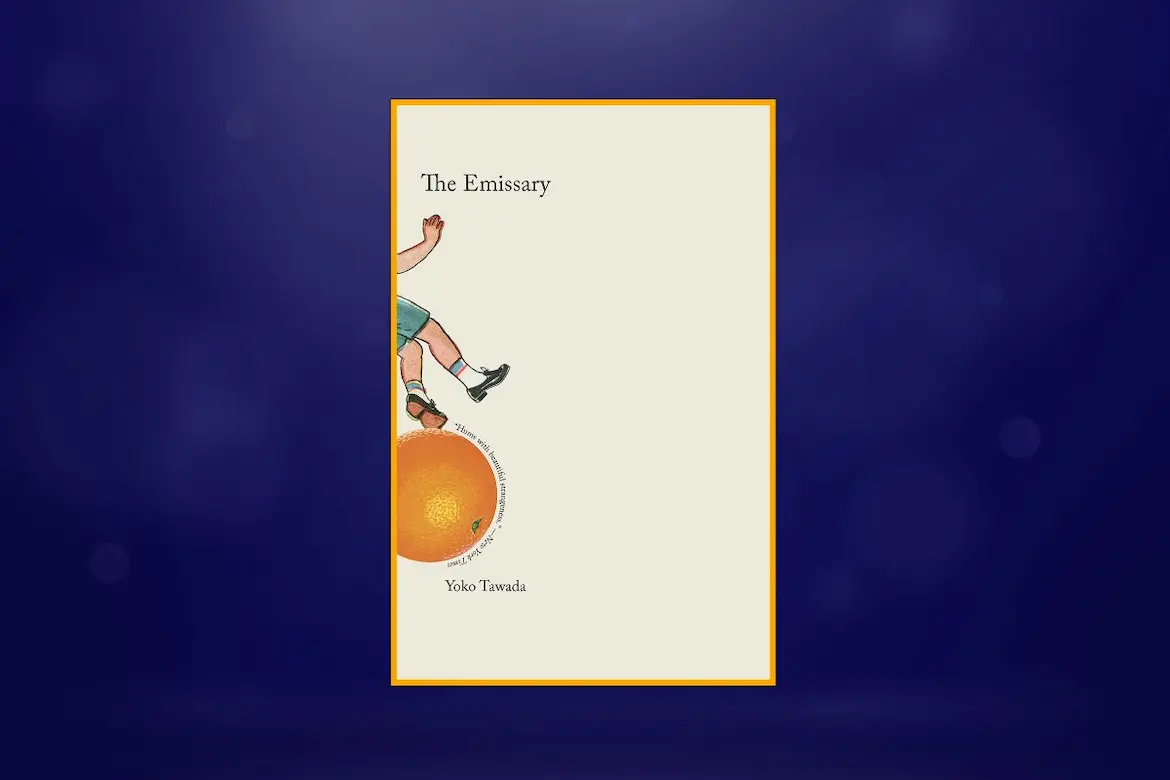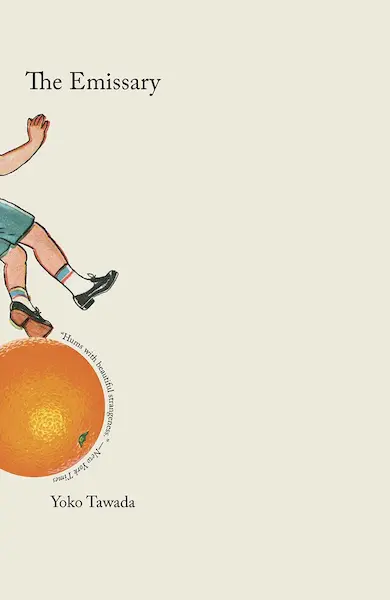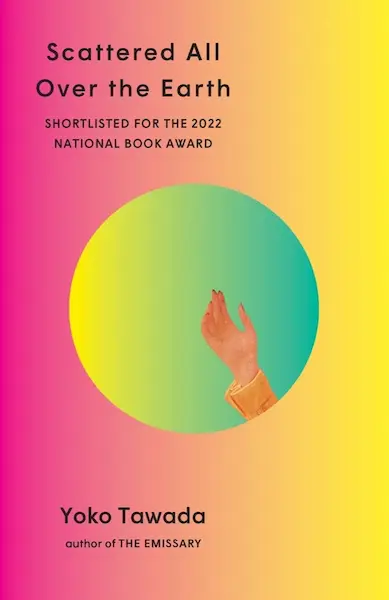Yoko Tawada’s The Emissary is a breathtakingly light-hearted meditation on mortality and fully displays what Rivka Galchen has called her “brilliant, shimmering, magnificent strangeness”
We’re excited to bring you Rylie Fong’s review of The Emissary.
In This LitStack Review of The Emissary
The Emissary, by Yoko Tawada
Is our world headed on a one-way track to ecological destruction? With conversations about microplastics and global warming gaining more ubiquitous traction in the last ten years, this question is on the mind of the many generations looking towards the years to come. In The Emissary, Yoko Tawada explores this question in her quirky take on a dark dystopian future. Heart-breaking, funny, and sweet, this novel invites us to reflect on the importance of caring for our environment, our loved ones, and the future of these intertwined entities in our world.
Isolation and Entanglement
Yoshiro was still sunk beneath waves of anxiety, and here was Mumei, trying to cheer him up. That his great-grandson’s mental development consisted mainly of coming up with ever-new ways to comfort an old man made Yoshiro feel guilty. If only the boy would be a little more self-centered, do crazy things, live freely… (Tawada 18).
The rye bread Great-grandpa toasts for me smells good, but it’s sure hard to chew…Once when I said, ‘This toast tastes like blood,’ Great-grandpa looked like he was about to cry, so I decided to never say that again. (100).
Leading the reader into her speculative universe, Tawada does not explicitly explain why the world has become what it has become. Instead, she begins with Yoshiro, a 107 year old man who is in charge of caring for his great-grandson, Mumei. Through these characters, we slowly learn that adults have grown to be essentially immortal, while children are born so weak they can scarcely walk. Due to the fragility of their population, Japan suddenly decides to isolate itself from the rest of the world. By opening this novel with more of an immersive rather than explanatory voice, Tawada is showing us what life could become, rather than simply telling us a story.
The narrative begins mostly focused on Yoshiro’s perspective of their lives together, using his voice to paint an adult’s view on what is happening in the world. Evoking the all too recent memories of COVID-19 shelter-in-place, Yoshiro spends most of his time anxious or lonely, attempting to do his best to get fresh produce for the two of them, writing postcards to his daughter, and fretting over Mumei’s precarious health. Mumei, as a young boy, knows no different than the desolate life he lives, but dreams of a world when animals roamed and blue skies meant picnics and grassy fields.
Having two very different experiences of the world, Yoshiro and Mumei endure very different hardships in their daily reality. Knowing that life can be so much more than exists in isolation, Yoshiro feels guilt and anxiety for the new generations existing in the world of illness and decay that his own generation built. He must also experience the loss of everything he has once known and loved. Mumei, on the other hand, dreams of a world he will never know, and knows that the world he does know will be taken from him swiftly.
He endures pain daily from the moment he gets up, finding difficulty with chewing his breakfast and putting on his pants. These pains are ones only Mumei experiences, and despite the comedic way Tawada allows the reader to understand this, this leaves his healthier grandfather alone to feel the shame and fear they impart. Thus the physical isolation of Japan in this story is only equaled by the mental isolation of its citizens. By experiencing the same isolated world but with entirely different pains and perspectives, Mumei and Yoshiro are forced to be additionally isolated in their particular fears of for their lifetime (or lack of) to come.
Still, the two are forever bonded together by a dependency borne out of Yoshiro’s generation’s choices—Mumei needs Yoshiro to live, and Yoshiro needs Mumei to feel like his life has purpose. This is exemplified in the way that Tawada masterfully weaves together and yet juxtaposes the perspectives of both Yoshiro and Mumei. While they may be living in the same current reality, their lives in entirety are vastly separated by the limitations of it, and also intimately entangled in the mess of what the world has become.
Lightness of Being
Being able to see the end of anything gave him a tremendous sense of relief. As a child he had assumed the goal of medicine was to keep bodies alive forever; he had never considered the pain of not being able to die. (55)
Upon first reading, this story reminded me of Milan Kundera’s The Unbearable Lightness of Being. This sense of isolation and yet relational dependency between generations asks the question—what does it mean to live under the circumstances of a fleeting existence, and furthers on the question by asking, what do we make of one that never seems to end? In this future, with less technology, less reliable forms of communication, inverted familial structures, and general scarcity of resources, all relationships from romantic to familial crumble under the weight of immortality or crushing fleetingness.
Mumei’s life is buoyant with the lightness of an existence that will only last for under two decades. He finds levity in everyday moments, and a sense of whimsy in experiencing life while knowing it can be taken from him at any moment. When a dentist reveals that Mumei will likely have underdeveloped teeth and a difficulty chewing things for the rest of his life, Mumei remains upbeat, simply noting that sparrows have no teeth and get along with life just fine. Yoshiro, on the other hand, feels all of the weight of their circumstances. Hearing the dentist’s diagnosis, he is overwhelmed with fear and sadness because his well-advanced age has allowed him to experience almost too much. How has the future brought them to a fate where his great-grandson is comparing his life and lifespan to that of a sparrow? He has watched his family fall apart, his great-grandson’s growing fragility, the isolation of the world, the disappearance of goods and pleasurable experiences that used to make immortality an attractive future rather than a life sentence. He used to enjoy the crunch of rice crackers and the crackling bite of toasted bread, and now he has to soak Mumei’s food into soggy, baby food-like mush in order for him to eat. He used to go out with friends, travel, and have every convenience at his fingertips—what future does Mumei have except his great-grandfather and their simple home, and for how long?
This juxtaposition causes us to consider what makes life worth living. Similarly to Kundera’s work, Tawada posits that our choices define our lives, and have a ripple effect that we cannot expect, despite how inconsequential they may seem. As we see through Yoshiro, our choices have lasting impact on the next generation, and therefore ourselves as we find ourselves implicated and inextricable from the way they pan out. From Mumei, we learn the importance of both learning how little we need to find joy in our current circumstances rather than looking for the next best thing, and also are cautioned as to what end we might find should we risk too much. As we gain longer and longer lifespans through medical breakthroughs, ignoring the health of our planet in the aim to live longer or momentarily better, we have to ask at what cost.
Scaling Back
Assuming he had knowledge and wealth to leave to his descendants was mere arrogance, Yoshiro now realized. This life with his great-grandson was about all he could manage. And for that he needed to be flexible, in mind and body, with the courage to doubt what he had believed for over a century. (40).
Today, we often hear almost overwhelming cries against most of the technological “advances” of the modern age. Cheap online clothing brands made of plastic-heavy fabrics in unsafe and environmentally destructive facilities overseas; anxiety, depression, and inability to focus due to overexposure to the internet; toxic chemical leaks from pesticides into produce; the list goes on. Tawada imagines a world where these issues persist unchecked, leading to the ecosystem’s destruction.
Rather than technology “advancing” towards a futuristic vision of holographs and hoverboards, this illustration of future Japan opts to revert back to life before technology’s existence in a desperate attempt to reverse the damage to the environment and its inhabitants. Cellphones and even refrigerators become defunct. Organic produce becomes the most valuable commodity, and farmland the most desirable real estate. This brings to mind a trend that sky-rocketed in popularity during the COVID-19 pandemic, cottagecore. An aesthetic trend and a lifestyle for some, cottagecore idealizes a life without technology. In times where it feels like modern technology has failed us, returning to “the good old days” seems like an attractive option.
Returning to the good old days, however, certainly leaves grief in its wake for the loss of the life we had once known. With a tongue in cheek quality, Tawada creates the “Thingamabob Cemetery”, a place for relics of the life that once was which residents cannot bring themselves to completely forget—a resting place for maps of the world, garden shears, Yoshiro’s manuscript from his writing days, and more. Though the name has a light-hearted, childlike quality, the location itself is a reminder of a lifetime of mourning and loss. It is a reminder that, without balance, life can easily tilt towards extremes. As vaccines for COVID-19 became more widely distributed and businesses began to open once more, cottagecore has become almost forgotten as a microtrend from an era of loneliness, abandoned by many in the return of their chaotic, joyously connective, and consuming lives. It is not, however, completely forgotten—since this time, many have learned to love the slower, bucolic lifestyle and adopt pieces of it in learning to cook more for themselves, grow herbs in their apartments, and crocheting. These trends have been borne from a global pandemic that forced the world to slow down and reconsider life’s fragility, and the merits of a simpler life.
What can be learned from cottagecore and its effects on current popular culture, and what can be seen in the Thingamabob Cemetery, is the call for a more balanced life that protects our ability and future generations’ ability to build a better future. A life without balance is a life without advancement because it is a life without a future. By choosing to doubt the model of advancement as fast-paced and mindless consumption, and considering sustainability as a wealth we would be leaving for the next generation and ourselves, we choose another path that allows for potentiality rather than sure destruction and loss.
Where We Go From Here
You know, arigato was a pretty good word after all. When we think of ordinary things as arigatai—very rare, or special, we see them with a new sense of wonder and gratitude. Arigato. (119).
By inviting readers into this picture of the future using her distinctive world-building style, Tawada artfully creates a story that unpacks layers of what it means to be living in a world headed towards ecological destruction. With a light hand, she shows us how unsustainable the current course we are on truly is, and illustrates the heart-breaking end it may come to. In creating a more momentarily convenient or “advancing” world, there are consequences. In valuing convenience over sustainability, we lose stability and longevity. There is the eventual loss of things we find small comforts or conveniences, such as worldwide express shipping, microwaves, and televisions. As she shows, these are not only small things, but things that have become part of life, and parts of life that are taken for granted. Then there are the even greater losses—the loss of community, family, friends, and the wider world.
This is something that we have unfortunately already had a taste of with the universal trauma of the COVID-19 pandemic. As Tawada has aptly named this book, this future and what we have already experienced can be considered an “emissary” of what is to come. Rather than accepting these things as unavoidable messengers for a future of destruction and loss, we can still choose a path towards sustainability and balance. This does not mean we have to choose extremes—it is not a question of choosing a fully pastoral “cottagecore” life reminiscent of “the good old days”. Instead, she asks us to focus on the good still existent today—to maintain a world where there is still a choice in what life we choose to lead.
Rather than centering further consumption as the path to “advancing” our world, we can use the resources already at our disposal to preserve our future. This can mean taking more public transportation or walking more often, taking a step back from technology to foster meaningful bonds and in-person connection when we can, and buying less so we can appreciate more of what already exists and what more is to come. It means to see ordinary things and our lives now as something special, something to be grateful for, and something worth protecting. This book, indeed, can be seen as an emissary—but one where we are not too late to receive its message.
~ Rylie Fong
About Yoko Tawada, Author of The Emissary

Yoko Tawada is a Japanese writer from Nagano, Tokyo who currently resides in Berlin, Germany. Many of her books surround dystopian worlds that explore the consequences of environmental disaster, as well as the relationship of reality and language. She is known for her quirky, comedic style of writing, employment of magical realism, and immersive and transformative world-building. Her past awards include the Akutagawa Prize, the Tanizaki Prize, the Noma Literary Prize, the Izumi Kyōka Prize for Literature, the Gunzo Prize for New Writers, the Goethe Medal, the Kleist Prize, and a National Book Award.
Other Titles by Yoko Tawada
Other LitStack Resources
Be sure and look at our other LitStack Reviews for our recommendations on books you should read, including reviews by Lauren Alwan, Allie Coker, Rylie Fong, and Sharon Browning.
As a Bookshop, Malaprop’s, BAM, Barnes & Noble, Audiobooks.com, Amazon, and Envato affiliate, LitStack may earn a commission at no cost to you when you purchase products through our affiliate links.








